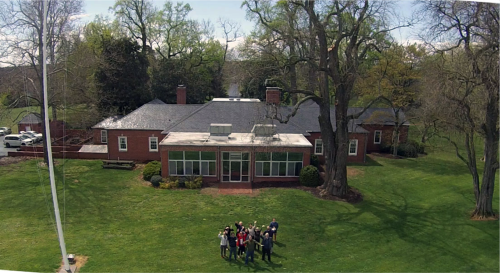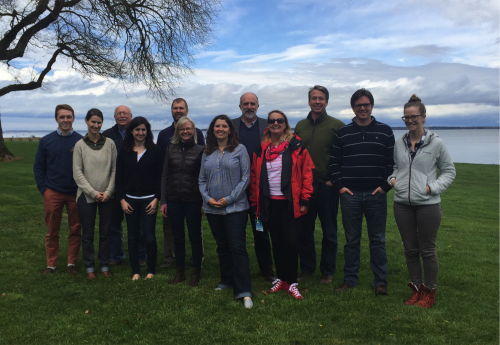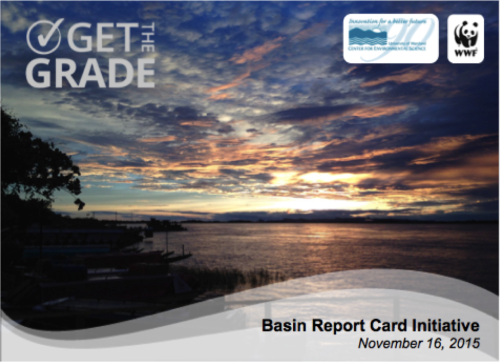A unique partnership between World Wildlife Fund and University of Maryland Center for Environmental Science
Bill Dennison · | Environmental Report Cards | Science Communication | Applying Science |This blog is part of the Basin Report Card Initiative: a partnership between the World Wildlife Fund (WWF) and the University of Maryland Center for Environmental Science (UMCES)
Don Boesch and I had lunch with our World Wildlife Fund colleagues Carter Roberts and Tom Dillon recently. Carter asked a question that a) we couldn’t answer immediately, and b) stimulated me to think about what makes our partnership unique. Carter asked us for other examples of partnerships between Non-Governmental Organizations (NGOs) and universities in the conservation realm. What we immediately thought of were NGOs that had part-time employees embedded in universities. The Conservation International on marine managed areas with Les Kaufman (Boston University) and Mike Orbach (Duke University), for example. We also worked with Peter Kareiva, former Chief Scientist at The Nature Conservancy (TNC) on Climate Adaptation Strategies and the new TNC Chief Scientist Hugh Possingham on environmental report cards. But our WWF-UMCES partnership is more than star scientists who maintain an academic role, it is the blending of teams of scientists, lawyers, engineers and communicators to achieve specific goals. This WWF-UMCES partnership is still forming, but the progress to date has been impressive. It is worthwhile to begin to analyze elements of the partnership to provide insights into a) maintaining and improving our partnership and b) developing a model for NGO-university partnerships.

Chris Roche, LaTrobe University, posted an insightful blog on the topic: “Effective partnerships between NGOs, civil society organizations & universities”. Roche provides the six reasons for such partnerships (numbered text) with my reaction to each as follows:
- We live in a world that demands collaboration. I totally agree with this point in that our environmental problems require social, economic and natural sciences to inform and aid in problem solving, with an increasingly need to learn how to effectively collaborate across disciplines.
- Universities provide an independent view, needed with increasing scrutiny of NGOs. Several times during my career, I have needed to invoke tenure, not as job security, rather as independent academic freedom to produce scientific synthesis (e.g., nutrient effects on the Great Barrier Reef) or to produce report cards (e.g., Chesapeake Bay). This independence invoked in academe is crucial for building and maintaining public trust.
- Universities can mobilize the energy and commitment of students and researchers. One of the most amazing things to observe is a researcher or team of researchers in hot pursuit of an idea. They will endure severe hardships, persist in the face of opposition or indifference and work intensely to obtain, analyze and interpret data if they are motivated to prove or disprove a theory.
- Partnerships can explore innovations at different levels. Innovation occurs on many fronts. NGOs can innovate in ways to engage stakeholders, communicate results and universities can innovate in ways to collect, analyze and visualize data.
- We need to train the new generation of problem solvers. Graduate training is a primary role of academia and our efforts at UMCES to obtain accreditation, revise the graduate program curriculum and develop new training and professional development opportunities targets the goal of training a new generation of problem solvers. We are currently developing a course in how to produce environmental report cards as part of our UMCES-WWF partnership.
- Universities need to be more than ivory towers and help solve societal problems. UMCES has embraced the four pillars of scholarship of discovery, integration, application and teaching (Boyer 1990; Scholarship Reconsidered: Priorities of the Professoriate). Tenure and promotion at UMCES is tied to these four pillars and the Integration and Application Network was formed expressly to address problem solving.

My view on partnerships is that they succeed when the positive attributes of each organization can be tapped while circumventing the negative features. For example, researchers at universities are very good at deliberate thought, undertaking thorough analyses, and writing peer review publications. On the other hand, universities do not tend to be nimble organizations, can become rigidly bound to disciplines and typically do not reward researchers for conservation outcomes achieved with NGOs. NGO staff are very good at making connections between organizations using global networks, engaging stakeholders and rapidly mobilizing resources. On the other hand, NGO staff often have many competing demands on their time with extensive travel commitments and little time for deliberative thought and writing time. We are attempting to emphasize the positive attributes of each organization by co-producing various products, traveling to organizing stakeholder workshops together, and developing a shared vision of future products.

In our WWF-UMCES partnership, we have developed the Basin Report Card Initiative. As part of this effort, we are co-producing a report card on the Orinico River in a stakeholder driven process and co-writing a practitioner’s guide. As we conduct these activities, we are tracking our progress with blogs, newsletters and feature articles. We are meeting regularly with phone calls, face-to-face meetings and retreats to brainstorm approaches that transcend what we have individually been able to accomplish to date. It is very exciting to be able to achieve so much more than we could without our partnership. We come away from every face-to-face meeting and retreat energized and inspired.
About the author
Bill Dennison

Dr. Bill Dennison is a Professor of Marine Science and Vice President for Science Application at the University of Maryland Center for Environmental Science.